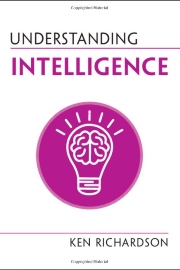Understanding Intelligence
Ken Richardson
Cambridge University Press, £11.99

Is intelligence caused by genes or environment? Or both? Can we even meaningfully talk about what intelligence is or measure it precisely? These are the sorts of questions Ken Richardson addresses in his summary of the latest thinking on intelligence research.
Part of the ‘Understanding Life’ series from Cambridge University Press, the book begins with a brief history of intelligence research and attempts to construct measures of intelligence, such as IQ (intelligence quotient) tests. Richardson explains how much of the early research happened in the context of the eugenics movement and sees this as inseparable. He goes on to explain his view that where IQ test scores do correlate with life outcomes it is because they are calibrated as such – “to match prior beliefs about its social distribution”.
The author goes on to criticise the ‘agricultural model’ of intelligence, which views the causal pathways, too simplistically in his view, as essential ‘genes + environment’. Ultimately, Richardson is suspicious of simple causal explanations linking intelligence, or any complex behavioural trait for that matter, to genetics in any straightforward way.
The book outlines an approach to intelligence that sees it more as an emergent property resulting from an organism’s interaction with ever-changing environments. For Richardson, intelligence “is to be found in the relations between components, not in the components themselves”, so it cannot be simply located at the level of genes, or an individual brain, but rather in the behaviour of the organism as a biological system.
Although less than 200 pages, it’s relatively dense, but has a useful summary at the end and a collection of myths, as Richardson sees them, about intelligence. The author is honest in points where he is being selective with examples in the aid of his argument, so the reader can evaluate for themselves whether he’s being fair-handed.
I found his argument compelling: that much received wisdom about intelligence, especially relating to genetics, is not only a simplification, but conceptually misleading and incomplete. It is worth a read wherever you stand on the genetics of intelligence.
Conor McCrory MRSB


